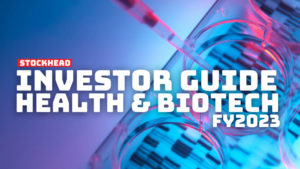- Blood clot programs have taken the spotlight recently as new discoveries made
- Two ASX health stocks are in the blood clot space
- Top performing ASX healthcare stocks in the past month
Blood clots were top of biotech news this week after researchers revealed a new discovery that could prevent them without increasing the risk of bleeding.
Investigators at the University Hospitals Cleveland Medical Center are targeting overactive neutrophils, a specific kind of white blood cell, to prevent almost all types of blood clots while causing no increased risk for bleeding.
The preclinical findings, published in Science Translational Medicine, may lead to safer ways to care for patients impacted by blood clots.
According to the US Centers for Disease Control and Prevention (CDC), roughly 900,000 people in the US suffer from life-threatening blood clots each year.
In the past, arterial and venous thrombosis have been thought of as two distinct events that require separate treatments.
Arterial thrombosis (an artery clot), which can cause heart attack or stroke, is commonly treated with antiplatelet agents like aspirin.
Anticoagulants meanwhile have been used to treat venous thrombosis (a vein clot), a cause of pain or swelling in the legs or clots in the lungs.
More recently however, experts have begun to suspect commonalities between the two events that could be leveraged as novel therapeutic targets.
In the new study, Dr Lalitha Nayak and her colleagues at the University use animal models to show that overactive neutrophils have an impact in both arterial and venous thrombosis through its capacity to adhere to the sites of injury.
The researches also showed that overactive neutrophils increase the production of key factors used as building blocks for clots.
“Because neutrophils have an important role in innate immune function, if we target all neutrophils, we will increase our risk for infections.
“But here, we are beginning to say that we can identify activated neutrophils and only prevent those active ones from participating in the clot,” said Dr Nayak.
Pharma giants are in the game
According to a Bloomberg report, blood clots are estimated to cause about 1 in 4 deaths worldwide.
Current leading blood thinner brands prescribed to prevent them, Eliquis and Xarelto, are among the most widely used medicines globally.
These thinners are also called Factor Xa inhibitors, a shout to the enzyme they block in the body’s natural clotting process.
But these thinners can’t be used in many emergency situations including, critically, preventing strokes in people who’ve already had one.
There is now a buzz around alternative experimental drugs from Bayer, Bristol-Myers Squibb (and its partner Johnson & Johnson), and Anthos Therapeutics, a biotech that launched in 2019.
It will take a few more years before any of them become available, but Andrew Baum, an analyst at Citigroup, says the long-term potential is huge. He estimates the new drugs could become a $55 billion category by around 2035.
Two ASX companies with blood clot programs
Cyclopharm (ASX:CYC) is a radiopharmaceutical company with a flagship product called Technegas.
Technegas is a lung imaging agent used primarily to diagnose the presence of blood clots in the lungs known as Pulmonary Emboli (PE).
The agent is produced in a specially designed machine called the TechnegasPlus Generator by heating Technetium-99m in a carbon crucible for a few seconds at 2,750 degrees Celsius.
Once inhaled by the patient suspected of having PE, the patient’s lung is then imaged under a gamma camera.
Most recently, a French multicentre study has demonstrated that Technegas plays a key role in diagnosing PE in COVID-19 patients.
This study supports Cyclopharm’s strategy to extend its market beyond the current core nuclear medicine customers to respiratory and emergency medicine globally.
CSL (ASX:CSL), Australia’s biggest life sciences company, has made major advances in haemophilia (blood clot disease) in recent years.
The company has exclusive global licence rights to commercialise IDELVION for the treatment of haemophilia B.
Additionally, CSL is also undertaking research and development efforts to explore gene therapy to tackle haemostasis and thrombosis.
CSL started developing the gene therapy, known as EtranaDez, after signing a $655 million deal with genomic medicine company Uniqure in 2020.
While patients with haemophilia B lack the blood clotting protein Factor-IX and have to go multiple IV treatments, EtranaDez aims to instruct their cells to produce the clotting factor that they lack.
Best and worst performing ASX biotechs over the past month
| CODE | COMPANY | PRICE | 1 WEEK RETURN % | 1 MONTH RETURN % | 1 YEAR RETURN % | MARKET CAP |
|---|
| CGS | Cogstate | 2.13 | 7.85% | 56.62% | -3.62% | $368,000,000 |
| ACW | Actinogen Medical | 0.094 | 22% | 34% | -15% | $159,834,550 |
| ALA | Arovella Therapeutic | 0.033 | 6% | 32% | -28% | $20,796,375 |
| DVL | Dorsavi Ltd | 0.014 | -18% | 27% | -29% | $6,090,087 |
| HXL | Hexima | 0.017 | 13% | 21% | -96% | $2,715,559 |
| PAR | Paradigm Bio. | 1.55 | 28% | 21% | -24% | $422,214,544 |
| IVX | Invion Ltd | 0.012 | -8% | 20% | -14% | $77,041,105 |
| IHL | Incannex Healthcare | 0.2725 | 5% | 18% | -21% | $396,134,361 |
| BNO | Bionomics Limited | 0.061 | 20% | 15% | -62% | $82,554,395 |
| AN1 | Anagenics Limited | 0.035 | 0% | 9% | -45% | $7,735,746 |
| NEU | Neuren Pharmaceut. | 6.52 | -3% | 9% | 224% | $794,843,416 |
| LCT | Living Cell Tech. | 0.013 | 0% | 8% | 36% | $16,709,728 |
| PXS | Pharmaxis Ltd | 0.081 | -2% | 7% | -38% | $43,931,169 |
| PIQ | Proteomics Int Lab | 0.99 | -2% | 5% | 13% | $112,596,703 |
| MSB | Mesoblast Limited | 0.885 | 6% | 4% | -45% | $619,181,823 |
| WFL | Wellfully Limited | 0.027 | -7% | 4% | -84% | $7,524,825 |
| RAD | Radiopharm | 0.17 | 0% | 3% | 0% | $21,429,819 |
| MYX | Mayne Pharma Ltd | 0.2925 | 15% | 3% | -6% | $495,847,420 |
| CUV | Clinuvel Pharmaceut. | 19.68 | 15% | 2% | -53% | $956,090,040 |
| PBP | Probiotec Limited | 2.22 | -1% | 0% | 0% | $180,537,961 |
| MVP | Medical Developments | 1.715 | 9% | 0% | -65% | $141,540,487 |
| OCC | Orthocell Limited | 0.4 | 1% | 0% | -22% | $82,825,290 |
| AC8 | Auscann Grp Hlgs Ltd | 0.04 | 0% | 0% | -56% | $17,621,884 |
| AFP | Aft Pharmaceuticals | 3 | 0% | 0% | -25% | $314,598,780 |
| ARX | Aroa Biosurgery | 0.77 | 0% | 0% | -28% | $260,470,398 |
| SCU | Stemcell United Ltd | 0.013167 | 0% | 0% | 0% | $14,915,372 |
| PYC | PYC Therapeutics | 0.069 | -1% | 0% | -51% | $222,664,827 |
| PTX | Prescient Ltd | 0.175 | -3% | 0% | -30% | $111,314,123 |
| CU6 | Clarity Pharma | 0.63 | -3% | -1% | -50% | $114,088,353 |
| OPT | Opthea Limited | 1.115 | 0% | -1% | -17% | $525,191,917 |
| CTE | Cryosite Limited | 0.7 | -2% | -1% | 92% | $34,166,694 |
| CAN | Cann Group Ltd | 0.265 | -2% | -2% | -5% | $92,597,677 |
| CSL | CSL Limited | 290.44 | 2% | -2% | 1% | $138,588,933,868 |
| RAC | Race Oncology Ltd | 1.945 | 1% | -3% | -40% | $301,925,381 |
| ILA | Island Pharma | 0.175 | 0% | -3% | -47% | $7,568,107 |
| RCE | Recce Pharmaceutical | 0.775 | 13% | -3% | -20% | $138,011,465 |
| DXB | Dimerix Ltd | 0.15 | 15% | -3% | -48% | $47,328,866 |
| IXC | Invex Ther | 0.565 | 1% | -4% | -18% | $44,340,770 |
| CYP | Cynata Therapeutics | 0.325 | 7% | -4% | -47% | $47,281,276 |
| CYC | Cyclopharm Limited | 1.4 | 8% | -6% | -12% | $132,592,249 |
| PAA | Pharmaust Limited | 0.077 | 1% | -6% | -13% | $24,402,253 |
| RGS | Regeneus Ltd | 0.046 | -2% | -6% | -38% | $13,789,661 |
| AGN | Argenica | 0.455 | -1% | -6% | 14% | $29,254,907 |
| MXC | Mgc Pharmaceuticals | 0.015 | 0% | -6% | -74% | $42,759,710 |
| SPL | Starpharma Holdings | 0.59 | -3% | -6% | -53% | $247,108,261 |
| ANR | Anatara Ls Ltd | 0.055 | 0% | -7% | -63% | $3,924,559 |
| IMC | Immuron Limited | 0.081 | -9% | -7% | -42% | $18,223,868 |
| VLS | Vita Life Sciences.. | 1.675 | 2% | -7% | 11% | $84,852,179 |
| EPN | Epsilon Healthcare | 0.024 | 9% | -8% | -79% | $6,527,788 |
| CGB | Cann Global Limited | 0.021 | 0% | -9% | -79% | $5,436,345 |
| RNO | Rhinomed Ltd | 0.155 | 0% | -9% | -49% | $44,286,553 |
| IMM | Immutep Ltd | 0.255 | 2% | -9% | -52% | $222,600,216 |
| TLX | Telix Pharmaceutical | 5.32 | -1% | -9% | -7% | $1,559,277,541 |
| ATX | Amplia Therapeutics | 0.1 | 4% | -9% | -55% | $20,370,581 |
| BIT | Biotron Limited | 0.05 | 2% | -9% | -5% | $34,394,703 |
| AVH | Avita Medical | 1.645 | 2% | -9% | -67% | $122,349,992 |
| 1AD | Adalta Limited | 0.045 | -10% | -11% | -51% | $13,824,129 |
| GSS | Genetic Signatures | 0.845 | -2% | -11% | -41% | $126,179,676 |
| ACR | Acrux Limited | 0.056 | -2% | -11% | -55% | $15,984,373 |
| MDC | Medlab Clinical Ltd | 11.5 | 1% | -12% | -49% | $26,260,273 |
| AGH | Althea Group | 0.081 | 4% | -12% | -65% | $25,699,829 |
| BDX | Bcaldiagnostics | 0.066 | 0% | -12% | -62% | $8,982,251 |
| VBS | Vectus Biosystems | 0.7 | 0% | -13% | -53% | $32,130,889 |
| NC6 | Nanollose Limited | 0.061 | 0% | -13% | -31% | $9,230,955 |
| ANP | Antisense Therapeut. | 0.085 | 0% | -13% | -56% | $55,509,900 |
| ATH | Alterity Therap Ltd | 0.013 | 0% | -13% | -58% | $31,413,439 |
| EX1 | Exopharm Limited | 0.13 | -7% | -13% | -76% | $20,437,499 |
| BOT | Botanix Pharma Ltd | 0.062 | -3% | -14% | -6% | $65,117,640 |
| KZA | Kazia Therapeutics | 0.18 | -3% | -14% | -88% | $27,067,686 |
| ECS | ECS Botanics Holding | 0.021 | -5% | -16% | -43% | $23,241,344 |
| LGP | Little Green Pharma | 0.25 | 0% | -17% | -63% | $57,820,985 |
| AVE | Avecho Biotech Ltd | 0.01 | -9% | -17% | -50% | $22,054,432 |
| NXS | Next Science Limited | 0.775 | -1% | -17% | -39% | $161,092,601 |
| OSL | Oncosil Medical | 0.045 | -6% | -18% | -1% | $44,605,902 |
| CHM | Chimeric Therapeutic | 0.089 | -1% | -19% | -70% | $27,904,671 |
| CPH | Creso Pharma Ltd | 0.0315 | -2% | -19% | -70% | $53,571,215 |
| ADO | Anteotech Ltd | 0.045 | 0% | -21% | -82% | $89,457,580 |
| IMU | Imugene Limited | 0.1925 | 1% | -21% | -57% | $1,190,984,928 |
| ZLD | Zelira Therapeutics | 1.18 | -9% | -22% | -82% | $12,354,480 |
| NYR | Nyrada Inc. | 0.12 | -4% | -23% | -50% | $17,941,001 |
| PAB | Patrys Limited | 0.019 | -5% | -24% | -55% | $39,082,995 |
| GTG | Genetic Technologies | 0.003 | 0% | -25% | -67% | $27,701,895 |
| EOF | Ecofibre Limited | 0.21 | -11% | -25% | -75% | $73,335,056 |
| IDT | IDT Australia Ltd | 0.091 | -3% | -27% | -85% | $21,691,962 |
| BPH | BPH Energy Ltd | 0.018 | 6% | -28% | -69% | $14,270,387 |
| MEM | Memphasys Ltd | 0.018 | -8% | -28% | -70% | $17,283,585 |
| NOX | Noxopharm Limited | 0.18 | -12% | -29% | -66% | $52,602,831 |
| NSB | Neuroscientific | 0.0925 | -3% | -56% | -79% | $13,271,127 |
Cogstate was the best performing biotech for the month as it surged following Nasdaq-listed Biogen’s (NASDAQ: BIIB) announcement that its experimental Alzheimer’s drug with Japan-based partner Eisai showed promising results.
In the Phase 3 study, Biogen’s lead drug lecanemab was shown to remove built-up plaque in the brain called beta amyloid, which researchers say would lead to a cognitive benefit for patients with early-stage Alzheimer’s.
While Cogstate was not part of the study, the company had entered into an agreement with Eisai in 2020 to grant Eisai rights to exclusively develop and distribute Cogstate’s digital cognitive assessment technologies in worldwide markets.
Such digital cognitive assessments will play an important role in supporting the types of large-scale cognitive assessment that will be necessary in the launch of disease modifying therapies such as Biogen’s lecanemab drug.
Actinogen was another Alzheimer’s focused company that surged following Biogen’s announcement.
The company also presented the progress of its Xanamem clinical development program that includes some background on the use of biomarkers for the development of drugs in Azheimer’s.
Xanamem’s novel mechanism of action is to block the production of cortisol inside cells through the inhibition of the 11β- HSD1 enzyme in the brain.
The drug is designed to get into the brain after it is absorbed in the intestines upon swallowing its capsule.
Arovella surged after announcing that its CAR19-iNKT cell therapy will be combined with Imugene’s onCARlytics (CF33-CD19) platform to target solid cancers in a pre-clinical trial.
The trial will explore the potential of expanding the use of ALA-101 in solid tumours, which pose significant unmet need and account for more than 90% of all diagnosed cancers.
The readout from the preclinical studies is expected in H1 2023.
Paradigm soared after announcing that the primary endpoint of its Phase 2 Clinical Trial has been met.
The PARA_OA_008 Synovial Fluid Biomarker Phase 2 Trial evaluated the treatment effects of iPPS on OA (osteoarthritis)-related pain, inflammation, and disease progression in humans.
Paradigm said it achieved positive top-line results in the trial, with patients demonstrating statistically significant improvement in pain, function, and stiffness scores at day 56 for the twice-weekly group compared to placebo.
Noxopharm is down 35% despite the company reporting encouraging new preclinical data from its long-term collaboration with UNSW Sydney.
The major findings of the study were that its drug CRO-67 killed tumour cells as well as barrier cells in samples taken from six patients who had their tumours surgically removed.
But the company also reported the resignation of non-executive director and founder, Dr Graham Kelly.
“My wife and I are still the company’s largest shareholders, and that is a position we intend to retain,” said Dr Kelly of his departure.
You might be interested in












